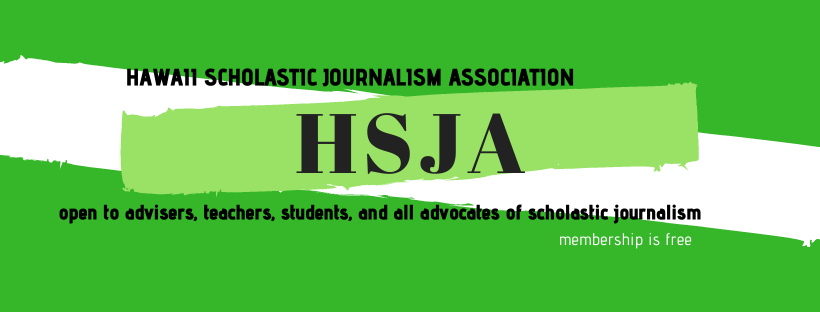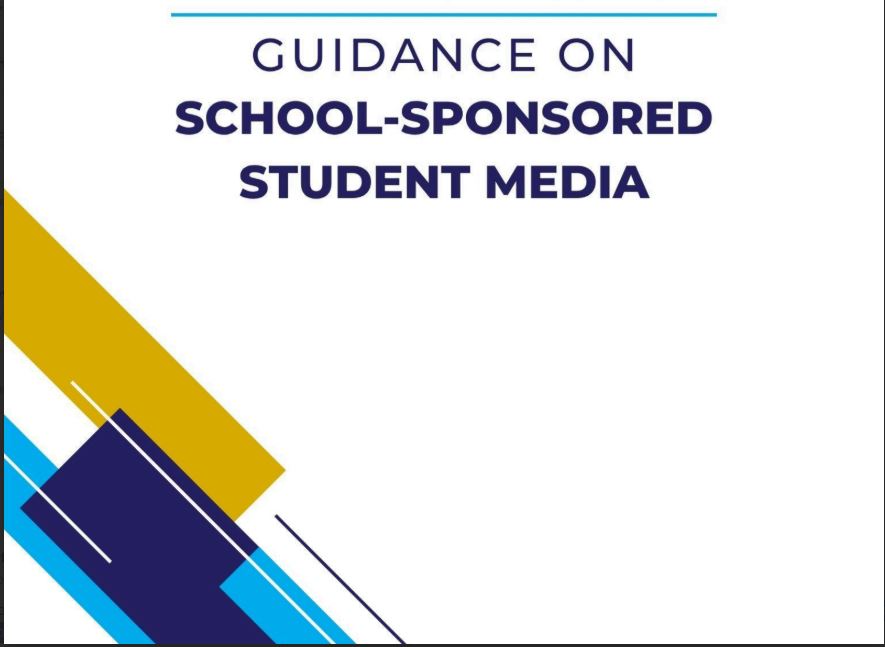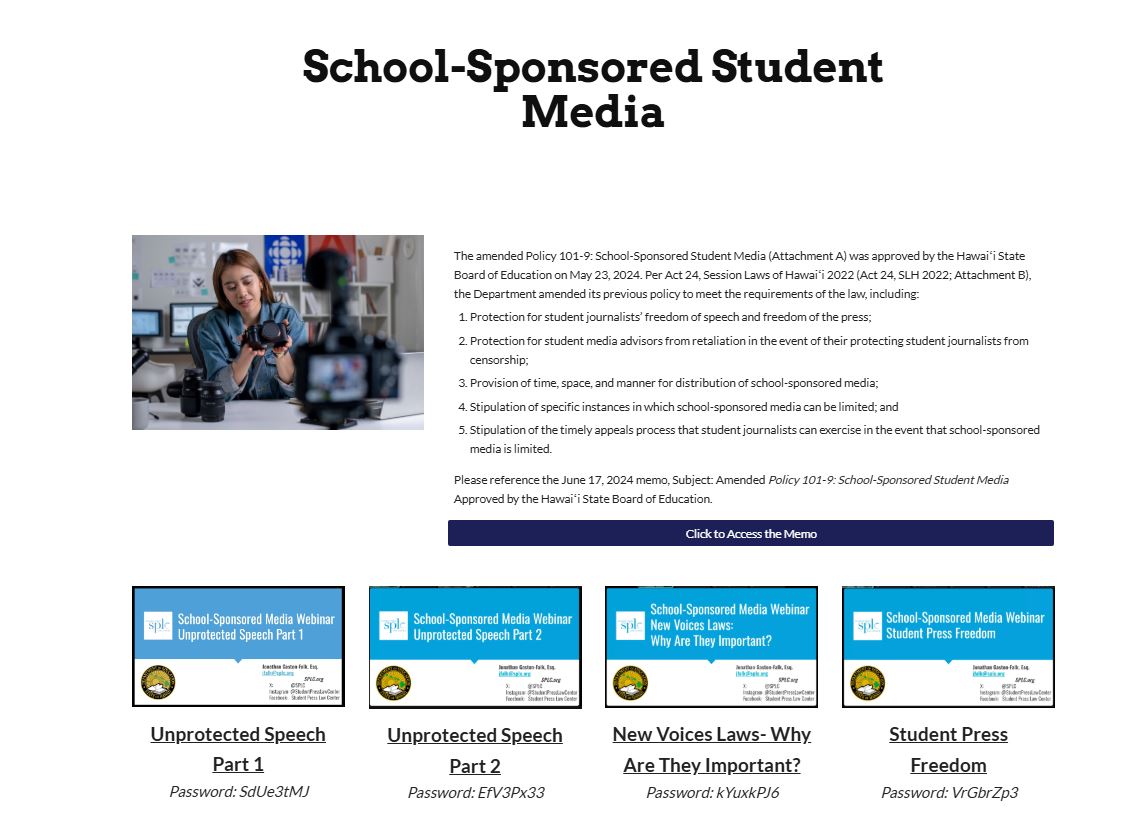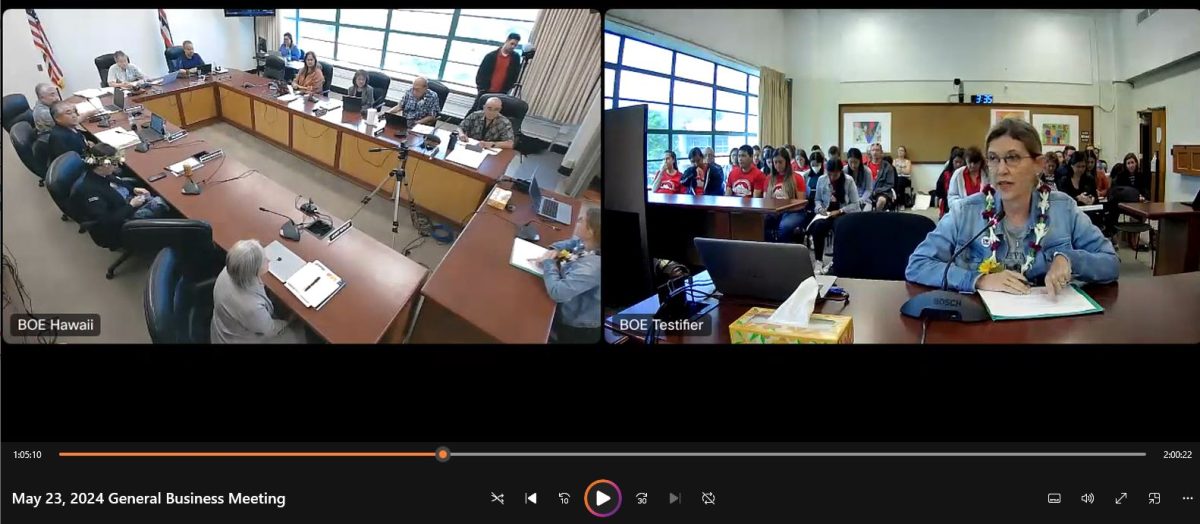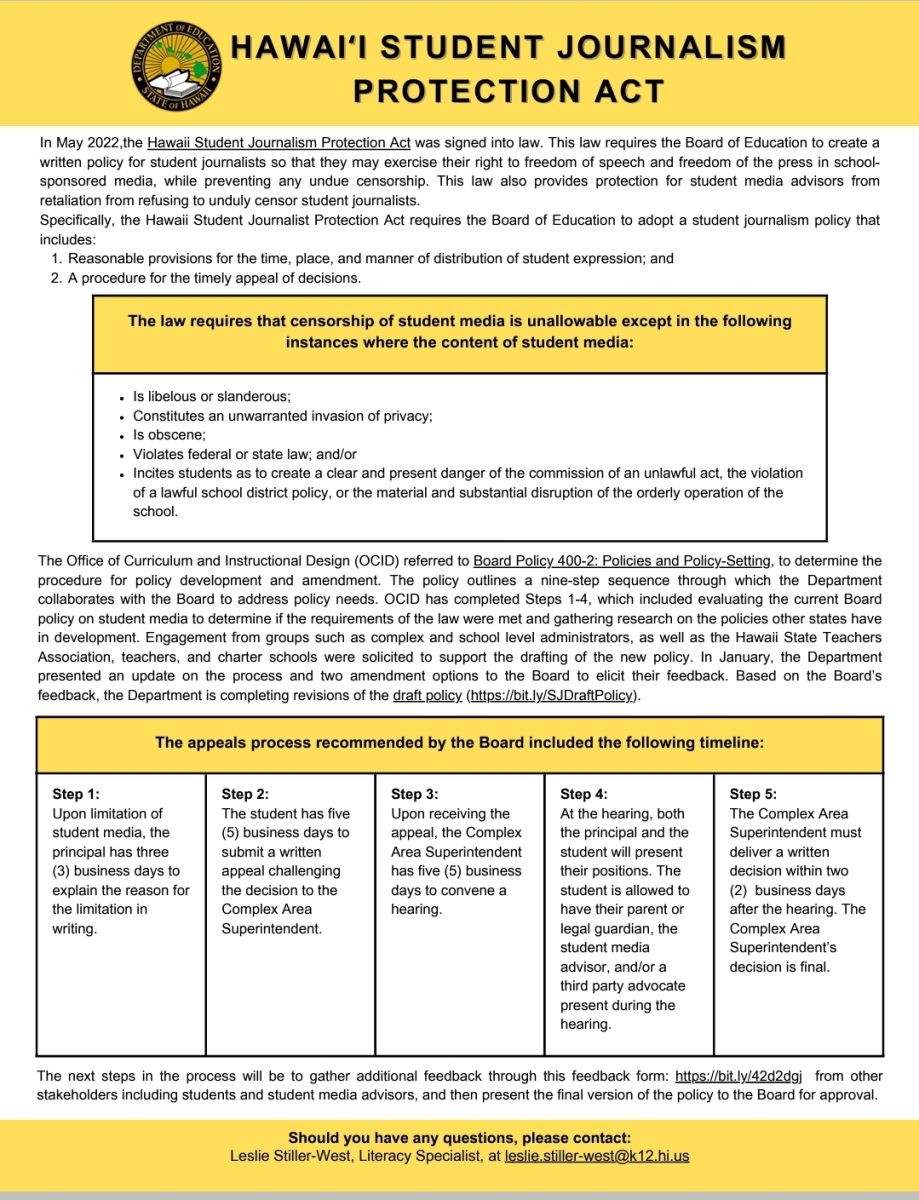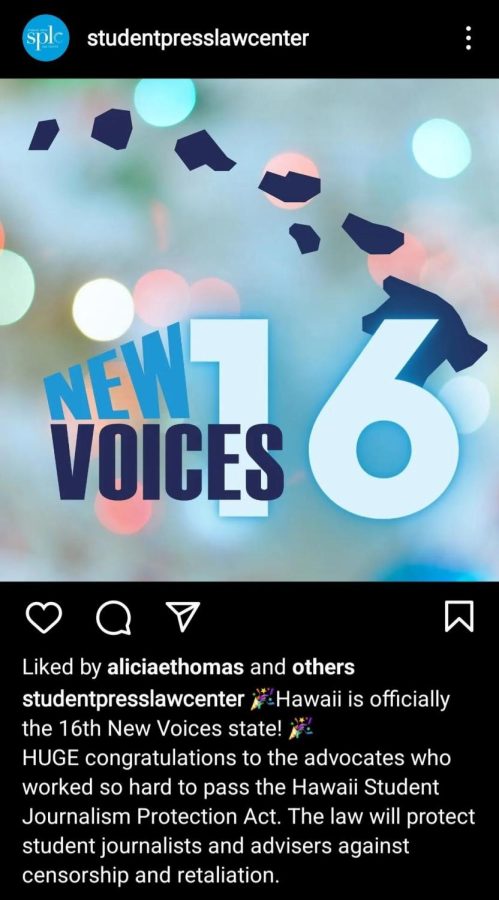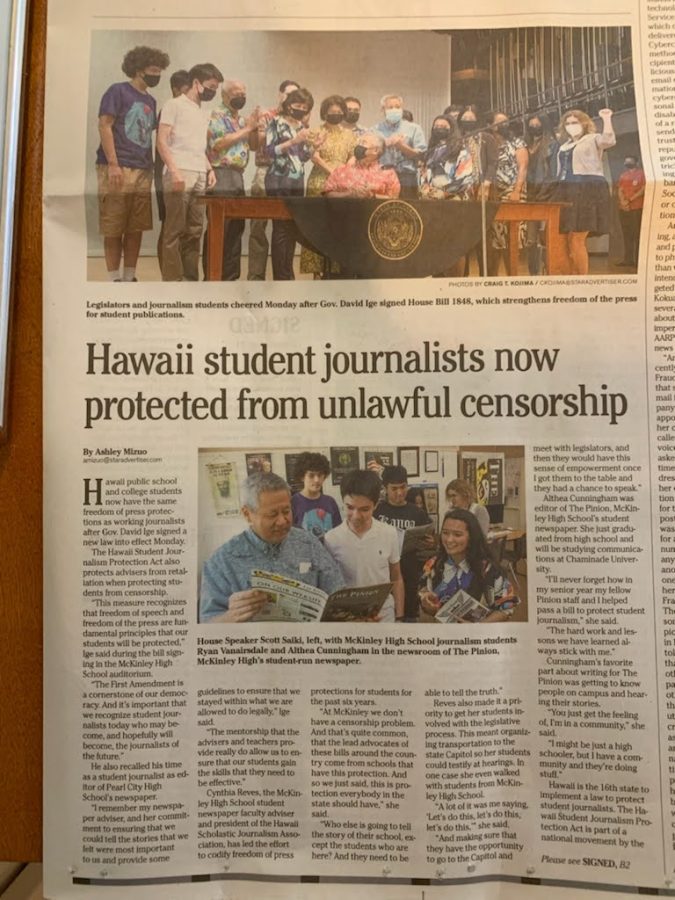
Update as of May 25, 2025
The DOE has informed us they have a scheduled meeting with their Data Governance Office to discuss this and will share an update when available. HSTA is also aware of the passage of this resolution.
Update as of Apr. 12
HR105 was adopted, meaning the House agrees that student journalists are not bound by FERPA and recommends the DOE modify the Student Publication Release form by Dec. 31, 2025, to reflect that. HCR109 did not get a hearing with the Senate Education Committee and therefore died, meaning this recommendation will not have the added backing of the Senate. However, the combination of the backing of the House and the DOE testimony that they concur with this resolution is a win.

https://www.youtube.com/live/Cs-jZMT5NCM?si=3G2SXaOvbU3GIpVp
Rep. Amy Perruso, one sponsor of HR105, posted this message to her Facebook page about the resolution’s adoption.
Flashback to my high school days and the Hatchet Job student paper at Fallbrook Union, where we fought against censorship—and won. That spirit of free expression is alive and well, thanks to the important work of McKinley High School’s journalism students and their teacher. They helped push a new resolution through the House that strengthens student press freedom, clearly laying out that school officials can’t hide behind FERPA or consent forms to silence student voices.
This isn’t just legislative housekeeping. It’s a big deal for any student daring to report real stories—from campus issues to broader community concerns. Back in my day, it took a lawsuit (Tiso v. Fallbrook Union High School) to prove that administrators have no right to muzzle student publications simply because they’re deemed “offensive.” Now, thanks to McKinley’s student journalists, the Department of Education is on notice: our Constitution doesn’t pause at the schoolhouse gate.
By supporting free and responsible scholastic journalism, we’re building tomorrow’s watchdogs, investigators, and truth-tellers. Democracy needs sharp minds—even teen minds—to challenge the status quo, shine light on tough topics, and keep power in check. Thank you, McKinley High, for reminding us that the First Amendment belongs to everyone—yes, even high schoolers. And thank you, Daniel Gluesenkamp and Phil Tiso, for bringing my brother and I into the Hatchet Job crew:)
Update as of Mar. 25
Thank you to all who submitted testimony for HR105 and HCR109 to the EDN committee. EDN passed it with amendments, adding a deadline of Dec. 31, 2025.
In oral testimony, the DOE said they have been working with me. That is true, but we had never reached a point where the DOE said they agreed with my concern. Their side of the conversation up to their Mar. 21 testimony had only been listening to my concerns so they could then investigate. So, when their written testimony stated that they agree that “student-authored articles published in school-sponsored media are not considered educational records” and thus FERPA does not apply, I was pleasantly surprised. I consider this public testimony a win. However, these resolutions do need to continue through the legislative process. I will be communicating with the Student Press Law Center for advice on how future testimony in support of these resolutions should be framed now.
The next committee the resolutions are referred to is JHA. Rep. Marina Poepoe’s office has confirmed it will be heard on Tuesday, Apr. 1 at 2 p.m., which means written testimony needs to be submitted by Monday, Mar. 31 by 2 p.m.
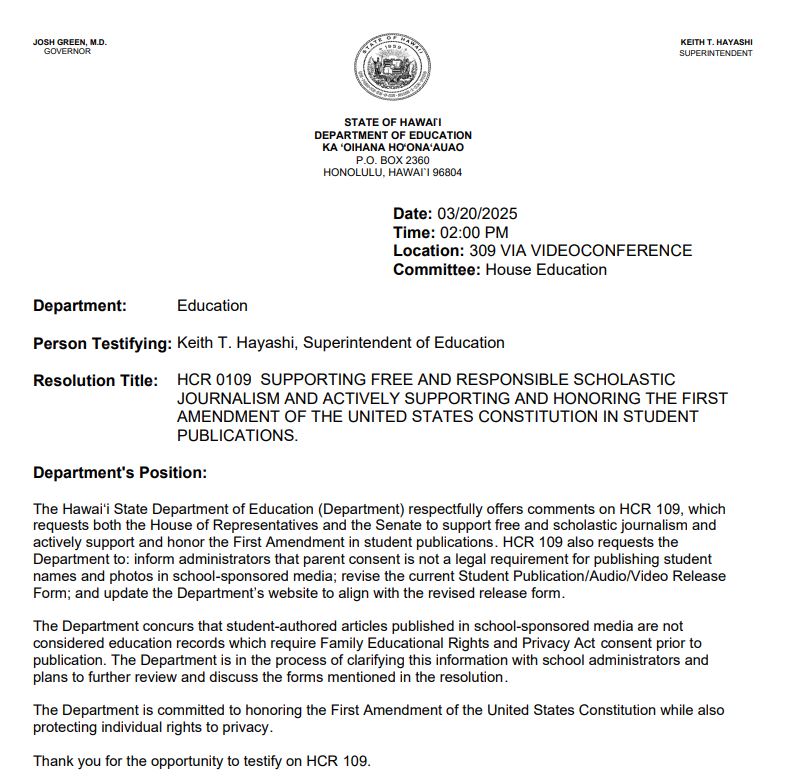
Reps. Amy Perruso, Terez Amato, Della Au Belatti and Elle Cochran introduced HR105 and HCR109 on behalf of Hawaii’s public school student journalists who operate under restrictions of the DOE’s Student Publication/Audio/Video Release Form-General.
These resolutions request the DOE revise the current SPAVR Form-General to remove any language that would lead a reasonable person to assume the Form applies to school-sponsored student-produced media because
- FERPA only restricts the release of information by school officials; outside parties, including student journalists, who are neither employees nor agents of the school are not covered by FERPA; and
- minors can give consent as long as they are cognitively able to understand what it means to talk to a journalist; and
- applying FERPA to student media is unnecessarily placing prior constraint on student journalists, which the Hawaii Student Journalism Protection Act disallows.
These reasons are supported by the DOE-sponsored webinars to educate student journalists, their advisers, and administrators about their rights and responsibilities, which can be found here.
Scholastic journalism advocates can support this resolution by:
1. Completing this Google Form (public school advisers only)
2. Register for Hearing Notifications.
3. Once the resolution gets assigned to a committee, contact the chair of the committee and ask that they hear the resolution.
Here is a possible script:
Two resolutions related to student journalism, HR105 and HCR109, have been referred to the _____ committee. I urge you to hear them. These resolutions concern an issue student media advisers and student journalists have been concerned about for a long time and outreach to the DOE has not been effective. This issue deserves a chance to be discussed in a public forum on the record.
4. Once the resolution gets on a hearing agenda, support this resolution with written, virtual, or in-person testimony.
- Tell the legislators how many students at your school have NOT returned the Student Publication Release Form. At McKinley that number is 400!
- Tell the legislators how student journalists make sure anyone they interview understands what it means to speak to a journalist.
- Tell the legislators that student journalists abide by the SJP Code of Ethics and if they think the student should inform their parents before something is published, student journalists ask the student to provide evidence of that because student journalists want to MINIMIZE HARM.
- Students who are not journalists could testify that they feel their freedom of speech is being violated if the school requires parental consent before allowing them to be included in student-produced media.
Please reach out to [email protected] if you have questions.

